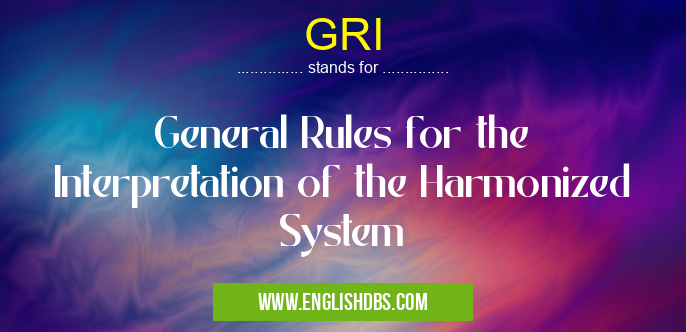What does GRI mean in INTERNATIONAL
GRI stands for General Rules for the Interpretation of the Harmonized System.

GRI meaning in International in International
GRI mostly used in an acronym International in Category International that means General Rules for the Interpretation of the Harmonized System
Shorthand: GRI,
Full Form: General Rules for the Interpretation of the Harmonized System
For more information of "General Rules for the Interpretation of the Harmonized System", see the section below.
The GRI is a set of six rules that are used to interpret the Harmonized System (HS) classification system. The HS is an international standardized system of classifying goods for customs purposes. It is used by over 200 countries and territories around the world.
The GRI is designed to ensure that the HS is applied consistently and uniformly by all customs authorities. The rules provide guidance on how to interpret the HS headings and subheadings, and how to classify goods that are not specifically covered by the HS.
GRI meaning in INTERNATIONAL
The GRI is an important tool for international trade. It helps to ensure that goods are classified correctly and that customs duties are applied fairly and consistently. The GRI is also used by businesses to determine the correct tariff classification of their goods, which can impact the cost of importing and exporting goods.
GRI Full Form
General Rules for the Interpretation of the Harmonized System
What does GRI stand for
GRI stands for General Rules for the Interpretation of the Harmonized System.
Essential Questions and Answers on General Rules for the Interpretation of the Harmonized System in "INTERNATIONAL»INTERNATIONAL"
What are the General Rules for the Interpretation of the Harmonized System (GRI)?
The GRI are a set of six rules that provide guidance on how to interpret and apply the Harmonized System (HS) codes. They are designed to ensure that HS codes are applied consistently and uniformly worldwide.
What is the purpose of the GRI?
The purpose of the GRI is to ensure that the HS is interpreted and applied in a uniform and consistent manner by all countries that use it. This helps to facilitate international trade by reducing the risk of disputes over the classification of goods.
Who is responsible for developing and maintaining the GRI?
The GRI are developed and maintained by the World Customs Organization (WCO). The WCO is an intergovernmental organization that works to facilitate international trade by developing and implementing customs standards and procedures.
How are the GRI used?
The GRI are used by customs officials, importers, exporters, and other stakeholders to interpret and apply HS codes. They are also used by statistical agencies to classify goods for the purposes of collecting trade data.
What are the six GRI?
The six GRI are:
- Classification of goods according to their intrinsic properties
- Classification of goods provisionally
- Classification of parts and accessories
- Classification of goods put up in sets for retail sale
- Classification of goods mixed or combined
- Classification of goods not specifically provided for
Final Words: The GRI is a valuable tool for customs authorities and businesses alike. It helps to ensure that the HS is applied consistently and uniformly, and that goods are classified correctly. This helps to facilitate international trade and ensure that customs duties are applied fairly and consistently.
GRI also stands for: |
|
| All stands for GRI |
